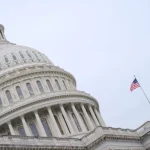

Fast-moving bipartisan House legislation that would force TikTok to seek an owner outside of China faces free-speech obstacles.
TikTok faces the risk of being forced to divest completely from its parent company, ByteDance, over its connections to the Chinese Communist Party.
The Protecting Americans from Foreign Adversary Controlled Applications Act, set for a vote Wednesday, would force TikTok to completely divest from its China-based parent company ByteDance or be banned in the United States. The short-form video app is doing all it can to try to stop Congress from passing the bill.
One of the bill’s weaknesses is the argument that it would run afoul of the First Amendment.
There are some “serious constitutional questions” facing Congress and the courts regarding this bill, said Kevin Goldberg, First Amendment specialist at the Freedom Forum, a nonpartisan organization advocating free speech. If the bill is signed into law, TikTok is expected to sue the federal government to challenge the law.
First Amendment risks
The legislation, introduced by Rep. Mike Gallagher (R-WI), has two major provisions of note. First, it would make it unlawful for app stores or web hosting services to provide services to social media applications owned by ByteDance, including TikTok. It would also give the president the power to designate other social media apps controlled by foreign adversaries, including North Korea, China, Russia, and Iran, and force them to divest. The legislation would give TikTok six months after passage to separate itself from ByteDance or be banned in the U.S.
Gallagher has defended his bill against allegations of inhibiting speech by claiming that it is only forcing TikTok to make a business decision. The bill is about “foreign ownership and control of an app,” the Wisconsin Republican told CNN’s Jake Tapper. Once the foreign ownership of the app is addressed, Gallagher argued, users will be able to say whatever they wish on the app.
The American Civil Liberties Union, though, argued that Gallagher’s bill would limit speech online. Banning TikTok would “have profound implications for our constitutional right to free speech and free expression because millions of Americans rely on the app every day for information, communication, advocacy, and entertainment,” the ACLU said in a statement.
“There are First Amendment issues involved with forcing a sale, which could also force an editorial policy change,” David Greene, senior staff attorney at the Electronic Frontier Foundation, told the Washington Examiner. These forced changes to the sort of content the platform can share would “affect the First Amendment rights of the U.S. entity that is TikTok as well as the rights of users.”
Sen. Mark Warner (D-VA), one of the co-authors of legislation that would require the Commerce Department to establish procedures for limiting transactions with companies operating out of foreign adversaries, told the Washington Post that he had “concerns about the constitutionality” of Gallagher’s bill. Warner said that he was speaking with the White House and other parties to clear up their understanding of the bill, and was interested in supporting it.
Court Arguments
If the legislation is passed, the federal government would bear the burden in court of “demonstrating the harm [of TikTok] to individual privacy or national security,” Goldberg argued. While there is evidence of TikTok spying on journalists and storing some U.S. user data in China, many discussions of the app’s national security threat have occurred behind closed doors, making it unclear if they would hold up under court scrutiny. But as long as the federal government can provide evidence of “actual dangers to national security,” Goldberg argued, then the courts should be somewhat deferential on the matter.
While the bill is focused on ownership and its implications for U.S. privacy, Greene noted, some of the bill’s co-sponsors “expressed concerns about young people being fed propaganda.” The focus on Chinese propaganda could be interpreted as evidence that Gallagher’s bill is intended to silence TikTok’s speech rather than just address the company’s ownership, Greene said. A determination that the law was primarily driven by a desire to stifle speech and not national security could shape a court ruling.
CLICK HERE TO READ MORE FROM THE WASHINGTON EXAMINER
Montana’s failed ban of TikTok is evidence that Gallagher’s bill would violate the First Amendment, according to the ACLU. In November, a federal judge ruled that the state’s blocking of the app “likely violates the First Amendment” and was an overreach of state power since Montana does not have an “important government interest in regulating foreign affairs.”






